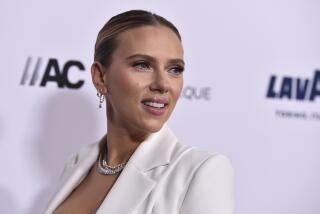Narration Stars for Blind Moviegoers : Entertainment: Newly developed ‘TheatreVision’ provides descriptive soundtracks and headphones for the visually impaired.
- Share via
Being blind accounts for Helen Harris’ unusual vision for the movie industry.
In her mind, she sees thousands of other sightless people sitting in theaters, enjoying the latest films by listening to a running account of the on-screen action through headphones.
That explains why two stars from the 1948 movie classic “Little Women” were back on the old MGM lot in Culver City on Wednesday dubbing a new soundtrack for the 1994 remake of the Louisa May Alcott story.
Janet Leigh and Margaret O’Brien were narrating the “Little Women” version that stars Winona Ryder and Susan Sarandon. Listening through earphones to the film’s dialogue and music, the two veteran actresses were recording descriptions of scenes unfolding on a screen in front of them.
Their narration is designed to be played through wireless headphones to vision-impaired moviegoers. So far Harris has done four films; two more are on tap. They have been shown only at special screenings.
But Harris, a Woodland Hills resident who heads a blind-support group called Retinitis Pigmentosa International, views the narration process as eventually playing at a theater near you.
She has won the support of Hollywood’s largest studios for the venture she calls “TheatreVision.” Theater owners are next in her sights.
“People assume that blind people aren’t interested in movies,” says Harris. “But that’s not true.”
The TheatreVision process borrows heavily from the concept of old-time radio dramas. Narration is woven around a film’s regular music, dialogue and sound effects.
Leigh and O’Brien had little difficulty sandwiching in their descriptions during Wednesday’s daylong dubbing session in a Sony Studios sound room. The pair--who will be joined later by former co-star June Allyson for recording work--volunteered their services.
“I’m hoping they’ll do this for our ‘Little Women’ next,” joked O’Brien.
Leigh recalled accompanying her blind grandmother to the movies early in her career. She sat at the woman’s side and whispered descriptions of her first MGM film, the 1947 “Romance of Rosy Ridge.”
“My grandmother could hear the dialogue. I explained to her what was happening. It was a great thrill for her,” Leigh said.
Harris said the idea of theater headphones came after she attended a screening of “Aladdin.” Other theater patrons had began shushing her son, Jim, when he tried to whisper descriptions of what was happening on the screen to her.
“People around us got mad,” Harris said. “People don’t like to be disturbed by people talking during a movie.”
*
Harris’ first experiment came last year when she recruited Dodgers broadcaster Vin Scully to narrate “Forrest Gump.” It was tested before about 300 blind patrons.
“I was able to visualize it in my mind,” remembers audience member Joan Taylor of Canoga Park, who can see only about 20 feet with one eye. “I have to be on top of the screen to see it. So I don’t get to the movies very often.”
Studio officials suggested Wednesday that TheatreVision will catch on, even though headsets may cost $15 each and transmitters could run another $6,000 per theater.
“We think the project is incredibly exciting and beneficial and will be ongoing,” said Janice Pober, a Sony Studios vice president who provided the “Little Women” film.
Barry London, vice chairman of Paramount Pictures’ movie group, said filmmakers have been “amazingly cooperative” in agreeing to let narration be written by Harris and her associates for their films.
“It opens up a brand-new audience,” said Disney Studios spokeswoman Terry Press. “An untapped audience is always of interest to both the studios and the exhibition community.”
More to Read
Only good movies
Get the Indie Focus newsletter, Mark Olsen's weekly guide to the world of cinema.
You may occasionally receive promotional content from the Los Angeles Times.








